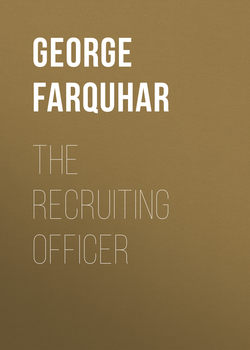Читать книгу The Recruiting Officer - George Farquhar - Страница 1
REMARKS
ОглавлениеIf the two last acts of this drama were equal to the three first, it would rank the foremost among Farquhar's works; for these are brilliant in wit, humour, character, incident, and every other requisite necessary to form a complete comedy. But the decrease of merit in a play, on approaching its conclusion, is, as in all other productions, of most unfortunate consequence.
The author was himself a recruiting officer, and possibly gathered all the materials for this play on the very spot where he has placed his scene – Shrewsbury. He has dedicated the piece "to all friends round the Wrekin," and has thanked the inhabitants of the town for that cheerful hospitality, which made, he adds, "the recruiting service, to some men the greatest fatigue on earth, to me the greatest pleasure in the world."
He even acknowledges, that he found the country folk, whom he has here introduced – meaning those most excellently drawn characters of Rose, her brother, and the two recruits, – under the shade of that beforementioned hill near Shrewsbury, the Wrekin; and it may be well supposed, that he discovered Serjeant Kite in his own Regiment, and Captain Plume in his own person. Certainly those characters have every appearance of being copied from life – and probably, many other of his Salopian acquaintance have here had their portraits drawn to perfection.
The disguise of Sylvia in boy's clothes, is an improbable, and romantic occurrence; yet it is one of those dramatic events, which were considered as perfectly natural in former times; although neither history, nor tradition, gives any cause to suppose, that the English ladies were accustomed to attire themselves in man's apparel; and reason assures us, that they could seldom, if ever, have concealed their sex by such stratagem.
Another incident in the "Recruiting Officer" might have had its value a hundred years ago – just the time since the play was first acted; but to the present generation, it is so dull, that it casts a heaviness upon all those scenes, whereon it has any influence. Fortune-tellers are now a set of personages, in whom, and in whose skill or fraud, no rational person takes interest; and though such people still exist by their profession, they are so vile, they are beneath satire; and their dupes such ideots, they do not even enjoy sense enough, for their folly to produce risibility.
Perhaps, the author despised this part of his play, as much as the severest critic can do; but having expended his store of entertainment upon the foregoing scenes, he was compelled to supply the bulk of the two last acts, from the scanty fund of wasted spirits, and exhausted invention.
The life of Farquhar was full of adventures. – As a student, he was expelled the college of Dublin, for adventuring profane wit upon a sacred theme, given to him by his tutor for his exercise.
As an actor, he forsook the stage in grief and horror, on having unknowingly made use of a real sword, instead of a counterfeit one, by which he wounded a brother performer, with whom he had to fence in a tragedy, nearly to the loss of his life.
In love, and marriage, his enterprises were still more unhappily terminated. – And merely as an author, and a soldier, can any events of his life be accounted prosperous.
As a dramatic writer, Farquhar was eminently successful; and in his military capacity, he was ever honoured and beloved – whether fighting with a great army in Flanders, or recruiting with a small party in Shropshire.
